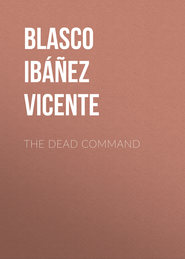По всем вопросам обращайтесь на: info@litportal.ru
(©) 2003-2024.
✖
The Shadow of the Cathedral
Настройки чтения
Размер шрифта
Высота строк
Поля
The morning light began to spread through the naves, bringing out of the darkness the spotless whiteness of the Toledan Cathedral, the purity of its stone making it the lightest and most beautiful of temples. One could now see all the elegant and daring beauty of the eighty-eight pillars soaring audaciously into space, white as frozen snow, and the delicate ribs interlacing to carry the vaulting. In the upper storey the sun shone through the large stained-glass windows, making them look like fairy gardens.
Gabriel seated himself on the base of one of the pilasters between two columns; but he was soon obliged to rise and move on, the dampness of the stone, and the vault-like cold throughout the whole building penetrated to his very bones.
He strolled through the naves, attracting the attention of the devotees, who stopped in their prayers to watch him. A stranger at that early hour, which belonged specially to the familiars of the Cathedral, excited their curiosity.
The bell-ringer passed him several times, following him with uneasy glance, as though this unknown man, of poverty-stricken aspect, who wandered aimlessly about at an hour when the treasures of the church were, as a rule, not so strictly watched, inspired him with little confidence.
Another man met him near the high altar. Luna recognised him also: it was Eusebio, the sacristan of the chapel of the Sagrario, "Azul de la Virgen,"[5 - Virgin's blue.] as he was called by the Cathedral staff, on account of the celestial colour of the cloak he wore on festival days.
Six years had passed since Gabriel had last seen him, but he had not forgotten his greasy carcase, his surly face with its narrow, wrinkled forehead fringed with bristly hair, his bull neck that scarcely allowed him to breathe, and that made every breath like the blast of a bellows. All the servants of the Cathedral envied him his post, which was the most lucrative of all, to say nothing of the favour he enjoyed with the archbishop and the canons.
"Virgin's blue" considered the Cathedral as his own peculiar property, and he often came very near turning out those who inspired him with any antipathy.
He fixed his bold eyes on the vagabond he saw walking about the church, making an effort to raise his overhanging brows. Where had he seen this strange fellow before? Gabriel noted the effort he made to recall his memory, and turned his back to examine with pretended interest a coloured panel hanging on a pillar.
Flying from the curiosity excited by his presence in the fane, he went out into the cloister; there he felt more at his ease, quite alone. The beggars were chattering, seated on the doorsteps of the Mollete; many of the clergy passed through them, entering the church hurriedly by the door of the Presentacion; the beggars saluted them all by name, but without stretching out their hands. They knew them, they all belonged to the "household," and among friends one does not beg. They were there to fall on the strangers, and they waited patiently for the coming of the English; for, surely, all the strangers who came from Madrid by the early morning train could only be from England.
Gabriel waited near the door, knowing that those coming from the cloister must enter by it. He crossed the archbishop's arch, and, following the open staircase of the palace, descended into the street, re-entering the church by the Mollete door. Luna, who knew all the history of the Cathedral, remembered the origin of its name. At first it was called "of justice," because under it the Vicar-General of the Archbishopric gave audience. Later it was called "del Mollete," because every day after high mass the acolytes and vergers assembled there for the blessing of the half-pound loaves, or rolls of bread distributed to the poor. Six hundred bushels of wheat—as Luna remembered—were distributed yearly in this alms, but this was in the days when the yearly revenues of the Cathedral were more than eleven millions.
Gabriel felt annoyed by the curious glances of the clergy, and of the devout entering the church. They were people accustomed to seeing each other daily at the same hour, and they felt their curiosity excited by seeing a stranger breaking in on the monotony of their lives.
He drew back to the further end of the cloister, then some words from the beggars made him retrace his steps.
"Ah! here comes old 'Vara de palo.'"[6 - Wooden staff.]
"Good-day, Señor Esteban!"
A small man dressed in black, and shaved like a cleric, came down the steps.
"Esteban! Esteban!" cried Luna, placing himself between him and the door of the Presentacion.
"Wooden Staff" looked at him with his clear eyes like amber, the quiet eyes of a man used to spending long hours in the Cathedral, with never a rebellious thought arising to disturb his immovable beatitude. He stood doubting for some time, as though he could scarcely credit the remote resemblance in this thin, pale face, to another that lived in his memory, but at last, with a pained surprise, he became convinced of its identity.
"Gabriel! my brother! is it really you?"
And the rigidly set face of the Cathedral servant, which seemed to have acquired the immobility of its pillars and statues, relaxed with an affectionate smile.
"When did you come? Where have you been? What is your life? Why have you come?"
"Wooden Staff" expressed his surprise by incessant questions, never giving his brother time to answer.
Gabriel at length explained, that he had arrived the previous night, and that he had waited outside the church since early dawn in the hopes of seeing his brother.
"I have now come from Madrid, but before that I was in many places: in England, in France, in Belgium, who knows where besides. I have wandered from one town to another, always struggling against hunger and the cruelty of men. My footsteps have been dogged by poverty and the police. When I rest a little, worn out by this Wandering Jew's existence, Justice, inspired by fear, orders me to move on, and so once again I begin my march. I am a man to be feared, Esteban, even as you now see me, with my body ruined before old age, and the certainty before me of a speedy death. Again, yesterday in Madrid, they told me I should be sent once more to prison if I stayed there any longer, and so in the evening I took the train. Where shall I go? The world is wide; but for me and other rebels it is very small, and narrows till it does not leave a hand's breadth of ground for our feet. In all the world nothing was left me but you, and this peaceful silent corner where you live so happily, and so, I came to seek you. If you turn me out, nothing will be left me but to die in prison, or in a hospital, if indeed they would take me in when they know my name."
And Gabriel, spent with his words, coughed painfully, a hollow cavernous cough that seemed to tear his chest. He expressed himself vehemently, moving his arms freely, with the gestures of a man used to speaking in public, burning with the zeal of his cause.
"Ah! brother, brother!" said Esteban, with an accent of mild reproof, "what has it profited you reading so many books and newspapers? What is the use of trying to disturb and upset things that are all right; and if they are all wrong, is there no other means of righting them possible? If you had followed your own path quietly, you would have been a beneficiary of the Cathedral, and, who knows, you might have had a seat in the choir among the canons, for the honour and profit of the family! But you were always wrong-headed, although you were the cleverest of us all. Cursed talent that leads to such misery! What I have suffered, brother, trying to hear about your affairs! What bitterness have I not gone through since you last came here! I thought you were contented and happy in the printing office in Barcelona, receiving a salary that was a fortune compared to what we earn here. I was disturbed at reading your name so often in the papers, at those meetings, where the division of everything is advocated, the death of religion and of the family, and I do not know what follies besides. The 'companion' Luna said this, or the 'companion' Luna has done the other, and I tried to hide from the people of the 'household' that this 'companion' could be you, guessing that such madness must turn out ill—furiously ill—and after—after came the affairs of the bombs."
"I had nothing to do with that," said Gabriel sadly. "I am only a theorist; I condemned the action as premature and inefficacious."
"I know it, Gabriel. I always thought you innocent. You so good, so gentle, who since you were a little one always astonished us by your kindness; you who seemed like a saint, as our poor mother used to say! You kill, and so treacherously, by means of such infernal artifices! Holy Jesus!"
And the "Wooden Staff" was silent, overcome by the recollection of those attempts that had overwhelmed his brother.
"But what is certain is," he continued after a little, "that you fell into the trap spread by the Government after those affairs. What I suffered for a while! Now and again I heard firing in the castle ditch beyond there, and I searched anxiously in the papers for the names of those executed, always fearing to find yours. There were rumours current of horrible tortures inflicted on those taken to make them confess the truth, and I thought of you, so frail, so delicate, and I feared that some day you would be found dead in a dungeon. And I suffered even more from my anxiety that no one here should know of your situation; you a Luna! a son of Señor Esteban, the old gardener of the Primate, with whom all the canons and even the archbishop talked. You mixed up with those infernal scoundrels who wish to destroy the world. For this reason when Eusebio the 'Virgin's Blue,' asked me if you could possibly be the Luna of whom he read in the papers, I replied that my brother was in America, that I heard from him now and again, but that he was occupied with a big business—you see what pain! Fearing from one moment to another that they would kill you, unable to speak, unable to complain, fearful of telling my distress even to my family. How often have I prayed in there! Accustomed as we of the 'household' are to associate daily with God and the saints, we may be a little hard and narrow-minded, but misfortune softens the heart, and I addressed myself to Her who can do everything, to our patroness the Virgin of the Sagrario, begging her to remember you, who used to kneel at her shrine as a little child when you were preparing to enter the seminary."
Gabriel smiled gently as though admiring the simplicity of his brother.
"Do not laugh, I pray you—your smile wounds me. The Divine Lady did all she could for you. Months afterwards I learnt that you and others had been put on board ship with orders never to return to Spain, and, up to the present time, never a letter or a scrap of news, good or ill. I thought you had died, Gabriel, in those distant lands, and more than once I have prayed for your poor soul, that I am sure wanted it."
The "companion" showed in his eyes his gratitude for these words.
"Thanks, Esteban. I admire your faith, but I did not come out of that dark adventure as well as you imagine. It would have been far better to have died. The aureole of a martyr is worth more than to enter a dungeon a man and come out of it a limp rag. I am very ill, Esteban, my sentence is irrevocable. I have no stomach left, my lungs are gone, and this body that you see is like a dislocated machine that can hardly move, creaking in every joint, as though all the bits intended to fall apart. The Virgin who saved me at your recommendation might really have interceded a little more in my favour, softening my jailors. Those wretches think to save the world by giving free rein to those wild beast instincts that slumber in us all, relics of a far-away past. Since then, at liberty, life has been more painful than death. On my return to Spain, pressed by poverty and persecution, my life has been a hell. I dare stop in no place where men congregate; they hunt me like dogs, forcing me to live out of the towns, driving me to the mountains, into the deserts, where no human beings live. It appears I am still a man to be feared, more to be feared than those desperadoes who throw bombs, because I can speak, because I carry in me an irresistible strength which forces me to preach the Truth if I find myself in the presence of miserable and trodden-down wretches—but all this is coming to an end. You may be easy, brother, I am a dead man; my mission is drawing to a close, but others will come after me, and again others. The furrow is open and the seed is in its bowels—'GERMINAL!'[7 - "It will sprout."] as a friend of my exile shouted as he saw the last rays of the setting sun from the scaffold of the gibbet. I am dying, and I think I have the right to rest for a few months. I wish to enjoy for the first time in my life the sweets of silence, of absolute quiet, of incognito; to be no one, for no one to know me; to inspire neither sympathy nor fear. I should wish to be as a statue on the doorway, as a pillar in the Cathedral, immovable, over whose surface centuries have glided without leaving the slightest trace or emotion. To wait for death as a body that eats or breathes, but cannot think or suffer, nor feel enthusiasm; this to me would be happiness, brother. I do not know where to go; men are waiting for me out beyond these doors to drive me on again. Will you let me stay with you?"
For all answer the "Wooden Staff" laid his hand affectionately on Gabriel's arm.
"Let us come upstairs, madman—you shall not die, I will nurse you; what you want is care and quiet. We will cure that hot head, which seems like that of Don Quixote. Do you remember when you were a child reading us his history in the long evenings? Go along, dreamer, what does it signify to you if the world is better or worse regulated? As we found it, so it has always been. What does signify is that we should live like Christians, with the certainty that the other life will be a better one, as it will be the work of God and not of man. Go up—let us go up."
And taking hold of the vagabond affectionately, they passed out of the cloister through the beggars, who had followed the interview with curious eyes, without, however, being able to hear a single word. They crossed the street and entered the staircase of the tower. The steps were of red brick, worn and broken; the whitewashed walls were covered on all sides with grotesque drawings and various inscriptions, scrawled by those who had ascended the tower, attracted by the fame of the big bell.
Gabriel went up slowly, gasping, and stopping at every step.
"I am ill, Esteban, very ill; these bellows let out the wind in every part."
Then, as though repenting his forgetfulness, he suddenly asked:
"And Pepa, your wife? I hope she is all right."
The brows of the Cathedral servant contracted, and his eyes became bright as though full of tears.
"She died," he said with laconic sadness.
Gabriel stopped suddenly, clinging to the handrail, struck with surprise; then, after a short silence, he went on, wishing to console his brother.
"But, Sagrario, my niece, she must have grown a beauty. The last time I saw her she looked like a queen, with her crown of auburn hair and her smiling face, with its golden bloom, like a ripe apricot. Did she marry the cadet, or is she still with you?"
The "Wooden Staff" appeared even more sad, and he looked grimly at his brother.
"She also died," he said drily.
"Sagrario also dead!" exclaimed Gabriel astounded.
"She is dead to me, which is the same thing. Brother, by all you love best in the world, do not speak to me of her."
Gabriel understood that he had opened some deep wound by his inquiries, and so said no more, beginning once more his ascent. During his absence a terrible event had happened in his brother's life—one of those events that break up a family and separate for ever those that survive.
They crossed the gallery covered by the archbishop's archway and entered the upper cloister called "the Claverias": four arcades of equal length to those of the lower cloister, but quite bare of decoration, and with a poverty-stricken aspect. The pavement was chipped and broken, the four sides had a balustrade running round between the flat pillars that supported the old beams of the roof. It had been a provisional work three hundred years ago, and had always remained in the same state. All along the whitewashed walls, the doors and windows belonging to the "habitacions" of the Cathedral servants opened without order or symmetry. These were transmitted with the office from father to son. The cloister, with its low arcade, looked like a street having houses on one side only; opposite was the flat colonnade with its balustrade, against which the pointed branches of the cypresses in the garden rested. Above the roof of the cloister could be seen the windows of another row of "habitacions," for nearly all the dwellings in the Claverias had two stories.















